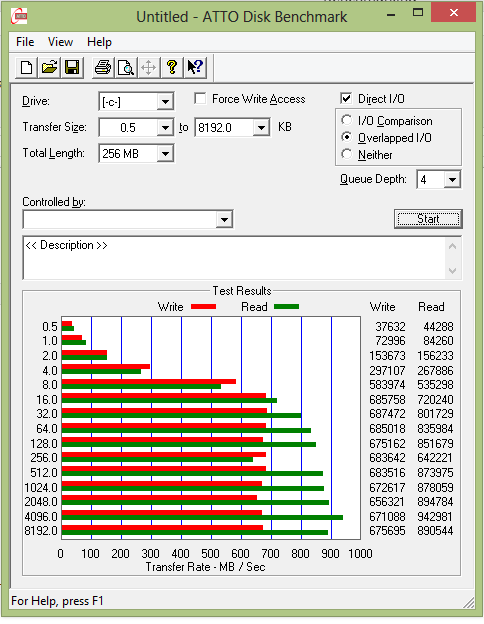ATTO Disk Benchmark is perhaps one of the oldest benchmarks going and is definitely the main staple for manufacturer performance specifications. ATTO uses RAW or compressible data and, for our benchmarks, we use a set length of 256mb and test both the read and write performance of various transfer sizes ranging from 0.5 to 8192kb. Manufacturers prefer this method of testing as it deals with raw (compressible) data rather than random (includes incompressible data) which, although more realistic, results in lower performance results.
Taking a look at our initial ATTO performance, we can see that the Acer has reached high transfer speeds of 942MB/s read and 687MB/s write which are the highest we have ever seen from any ‘non-custom’ portable system.
CRYSTAL DISK BENCHMARK VER. 3.0 X64
Crystal Disk Benchmark is used to measure read and write performance through sampling of raw (0/1 Fill/compressible) or random data which is, for the most part, incompressible. For these tests, we will display CDM results using highly incompressible data as the results with this specific SSD are almost identical.
 Although performance is a bit lower with Crystal DiskMark when comparing it to ATTO, this is typical and falls to reasoning of different data samples being transferred. ATTO uses highly compressible data samples such as software applications whereas CDM uses random or highly incompressible data samples as might be seen in photographs, music or video.
Although performance is a bit lower with Crystal DiskMark when comparing it to ATTO, this is typical and falls to reasoning of different data samples being transferred. ATTO uses highly compressible data samples such as software applications whereas CDM uses random or highly incompressible data samples as might be seen in photographs, music or video.
The highlight of this benchmark is the low 4k random write result of 148MB/s which is the highest we have seen to date, although we are certain that the RAID configuration plays a large role in this.
Up until recently, AS SSD was the only benchmark created specifically for SSD testing and it uses incompressible data. AS SSD, for the most part, gives us the ‘worst case scenario’ in SSD transfer speeds because of its use of incompressible data and many enthusiasts look to AS SSD for their needs.
When examining AS SSD results, we continue to see excellent performance and it takes things a bit further by displaying an initial high of 88,852 IOPS.
 The SSD Review The Worlds Dedicated SSD Education and Review Resource |
The SSD Review The Worlds Dedicated SSD Education and Review Resource | 

Anyone know where I can find out more about LITEONIT CMT-64L3M 64.0 GB ? That is what appears to be used in my ACER Aspire S5. 128 GB SSD system. Are there 2 mSATA slots or is this one module with 2 Channels ?
Steve
The laptop was unusable because of a know issue where WiFi connection is unstable; that means every few secons you get disconnects from your WiFi router, interrupting your internet connection.
Thanks….first I have heard of the issue. Will look into tx.
YOu probably tested the fan noise in Power save mode on batteries ?
This thing runs two 10K RPM fans producing 50db under load. not much load needed at all to go up to 50db. All other things are irrelevant. This is crappy laptop
Negative…tested as per normal use and I dont typically use power save mode.
Respected Sir,
I want to buy an ultrabook that has the follwing specifications,
SSD only,core i5,touch screen,battery backup upto 6 hrs.
Kindly suggest me the best option.
i will be greatly thankful to you.
What country will you be purchasing from?
INDIA
I cant offer any direct assistance there but to say just about every ultra fits your criteria.
Les,
Have you experienced any of the wifi issuies with the Acer that have been reported elsewhere?
Do you think the 128g version will have the same performance (transfer speeds, etc.) as the 256 that you reviewed?
I haven’t got the unit any more, however, the WiFi would not be associated to capacity of the SSD I wouldn’t think. I was looking it over from the piks that I have on hand and maybe its possible that they ran into the same issue that the S9 experienced where the Wifi was losing signal because of the aluminum shell. Samsung fixed that be incorporating two plastic pieces where the WiFi antenna sits.
Les,
Sorry I wasn’t more specific. I was wondering if the 128g version will have the same hard-wired data transfer performance as the 256.
I can’t test this but logically even you RAIDED write transfer speeds will drop somewhat for lower capacity drives when transferring highly incompressible data such as this.
Thanks. I ended up getting a 15.6″ Macbook pro with a 256SSD. I’ll be using your SSD optimization guide when it arrives:)
Were you able to confirm if the SSD can be upgraded to a higher capacity SSD using a normal msata drive or do the custom connectors/configuration make changing to a normal msata SSD impossible?